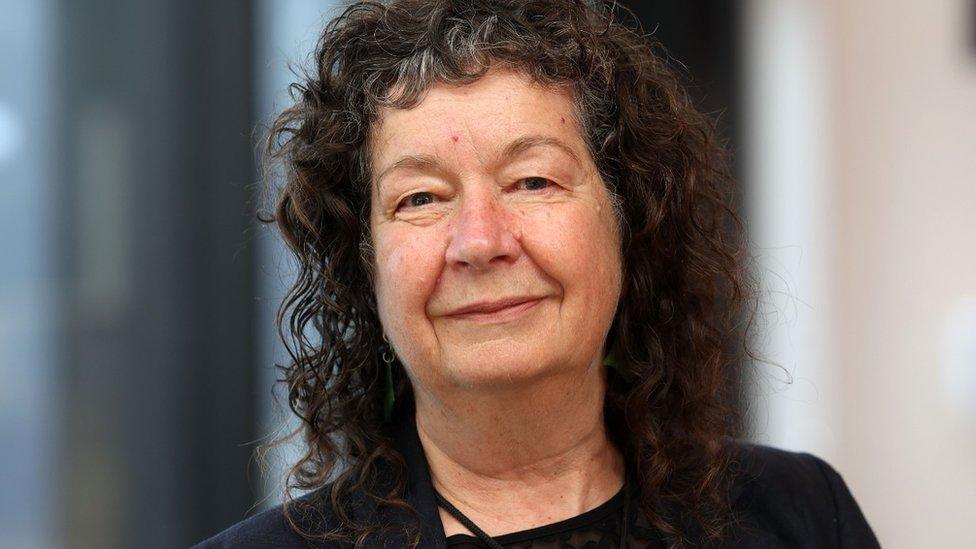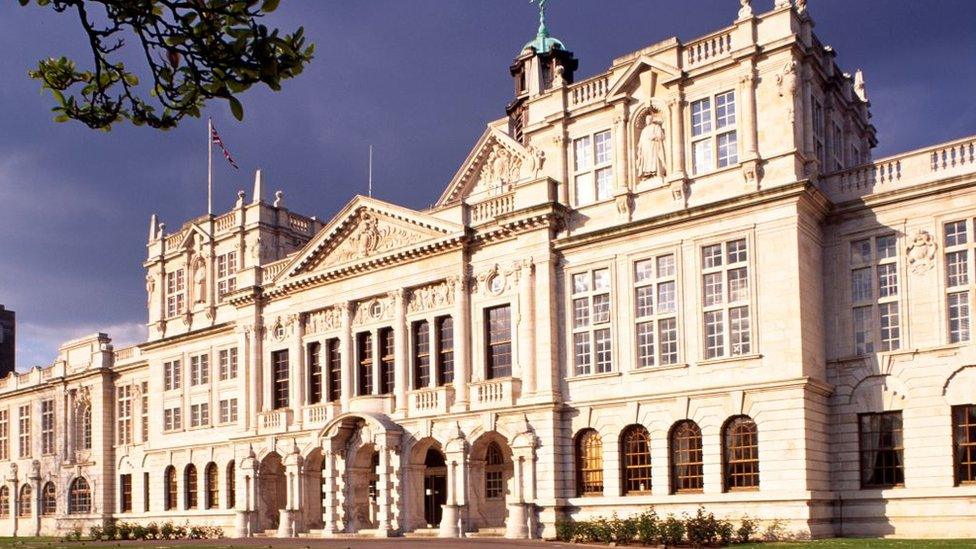Cardiff Uni: Time to question higher education model, new boss says
- Published

Cardiff University staged a graduation ceremony at the Principality Stadium for 16,000 students in 2022
The way higher education is funded is "broken", according to the new boss at Wales' biggest university.
Prof Wendy Larner said she was having a "big conversation" with Cardiff University staff about the future.
Her predecessor previously said finances were "unsustainable" due to inflation, less public money and frozen tuition fees.
The Welsh government said it was in "regular and constructive" contact with the higher education sector.
Prof Larner said it had been "a really tough few years" for students who had experienced the pandemic, staff strikes and cost of living pressures.
She took over in September, the first woman in the top job at Cardiff University which has 33,000 students and about 6,000 staff.
She took on the £290,000-a-year role from Prof Colin Riordan who was in the job for over a decade.
He spoke out earlier this year, highlighting differences in tuition fees which are capped at £9,000 per year in Wales compared with £9,250 in England.
In response, the Welsh government said then that it would "continue to work closely with our higher education sector to ensure they are able to continue to provide an excellent experience for student and staff".

"We are in a moment where the model for higher education is in question," says Prof Wendy Larner
What are the problems facing universities?
The way higher education is funded is "broken", according to Prof Larner.
"With our home students, the fees don't cover the cost of their education, the money we get for our research doesn't cover the cost of our research," she said.
Prof Larner said international students fees were subsidising the rest of the university's work and that had to change.
She said it was a challenging time for universities everywhere.
"We are in a moment where the model for higher education is in question - it's in question by governments, by publics, by our staff, by our students.
"We will need to be different for the future."
She suggested that could mean cutting back on what the university does, but she did not say what it might mean for jobs.
Prof Larner said any changes would be set out once she had consulted with staff and students.
"At this stage I don't know - that's why we're having the conversation."
A Welsh government spokesperson said: "The [Welsh Education] Minister is having regular and constructive engagement with the sector about a sustainable model for HE [higher education]."


New vice chancellors appointed at Cardiff Met, Aberystwyth University and University of Wales Trinity St David
There will be new bosses at five of Wales' eight universities by the end of this academic year.
New vice chancellors have been appointed at the University of Wales Trinity St David, Cardiff Met and Aberystwyth.
Wrexham's vice chancellor announced this week that she would be stepping down next year.

'A small country person'
Prof Wendy Larner is the first woman vice chancellor in Cardiff University's 140-year history.
She said it was a significant moment and "not before time, to be perfectly honest".
The old models of "the great man leading from the front" have had their day, she said.
"Leaders are much more effective when they work collaboratively... and that's certainly my style."
In a video for Cardiff University, Prof Larner said former New Zealand Prime Minister Jacinda Ardern was a "true hero of mine", revealing that she had cried when the politician announced she was standing down.
Prof Larner had a senior role previously at a university in Wellington, New Zealand, calling herself "a small country person" who "understands how small countries work".

Cardiff University's international students' fees subsidising the rest of its work, says Prof Larner
'A really tough few years for students'
"I do really feel for this cohort," said Prof Larner, adding that it had been a difficult time for staff too.
She said pastoral support was a priority at the university and something she cared passionately about.
Though it's an important part of universities' role, particularly for young people arriving straight from school, she said it was "not our field of expertise".
She said all universities were trying to work out how much responsibility they take on over students' wellbeing and when to pass on concerns to expert services.
Israel-Gaza and free speech
The new vice chancellor said it was extending support to students and staff who have been affected by events in the Middle East.
When asked how universities navigated issues where there is such strength of feeling, she said it was important to provide opportunities for a range of voices to be heard in respectful debates.
"Universities do have to be a platform for difficult conversations - that's one of our crucial roles and it's something that we should hold tightly."

WALES' HOME OF THE YEAR: Which home will be crowned the winner?
BAFTA CYMRU WINNERS: Check out these award winning shows

- Published20 October 2023

- Published3 November 2023
